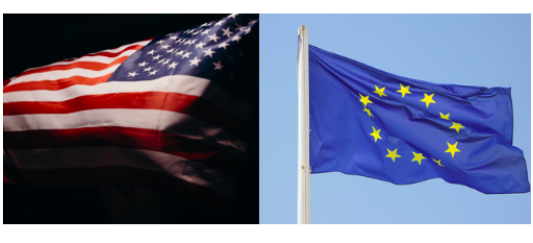The American elections have kept not only the US, but the whole world in suspense for the past few weeks, because these elections affect the rest of the world as well. The culmination of the presidential election was viscously slow, but at the end of last week the results finally came in and it appeared that Joe Biden won the majority of the votes in Pennsylvania, bringing his Electoral College vote total to 273. This makes Biden the 46th president of America. What will this change for the European Union?
EU/ US relations
The reactions of most of the member states of the European Union to Joe Biden’s win sounded as if an old friend was being welcomed. That is not very surprising after a four-year era in which Trump and the EU had a rather difficult understanding.
Although you cannot compare the two powers, their relationship goes back a long time, says Herman Matthijs, professor at the university of Brussels and Ghent, Belgium. “Much of the residents of the United States have European ancestry and in the period after the Second World War, a relationship between the two powers further developed.”
Peter van Ham, senior research fellow at the Dutch Clingendael Institute, says: “In economic and trade terms, the European Union has been an equal player to the United States for about fifty years. But when you look at security and defence, the EU hardly plays a role. It rather goes between the strong member states, such as France or Germany and the US. But the US has a lot more resources, prestige and connections. That is not surprising, because the European Union has actually only been working on this for the last ten or fifteen years.” Since taking office, President Trump has insisted on greater financial involvement of EU member states in NATO and he believes that the remaining NATO member states have benefited for too long from US forces and their contribution to the organisation.
Trumps relationship with the EU
NATO was by no means the only point of discussion between the EU and Trump. Since Trump took office, the relationship between Europe and America certainly did not approve. He has done little to improve his relationship with the EU in the four years he has been president. “But he is not the only one who paid little attention to foreign affairs”, says Matthijs. “There is actually more continuity than change in America”, says Van Ham. “During the Bush and Obama eras, the presidents also said other countries had to pay and contribute much more to NATO. That was not really taken seriously at the time.” Trump is actually saying almost the same thing, just in a less diplomatic way. He then actually carries it out, instead of just threatening. Trump not only speaks, but then also takes action. This is a rarity in politics today.”
Expectations about Biden
After his victory speech, ‘president-elect’ Joe Biden focused on the inauguration and his future policies, such as a package of Covid-19 measures and his first steps on the international stage. The question is what Biden is going to do with America’s relationship with the European Union. “Although Biden has promised that the US will soon re-join the Paris Climate Agreement, it is still uncertain what he will achieve, because he will need support from the Senate”, says Matthijs.
Furthermore, Biden is also left with the problem of the trade deficit. The problems Trump had to deal with, will not suddenly go away because Biden is there, he will also have to deal with those problems. Biden will probably take it a bit more diplomatically, but the problem remains the same. “When Biden becomes president, the pressure for the EU will be somewhat lower”, says Van Ham. “We will probably go back to square one, where the European Union can lean safely on the United states again.”




